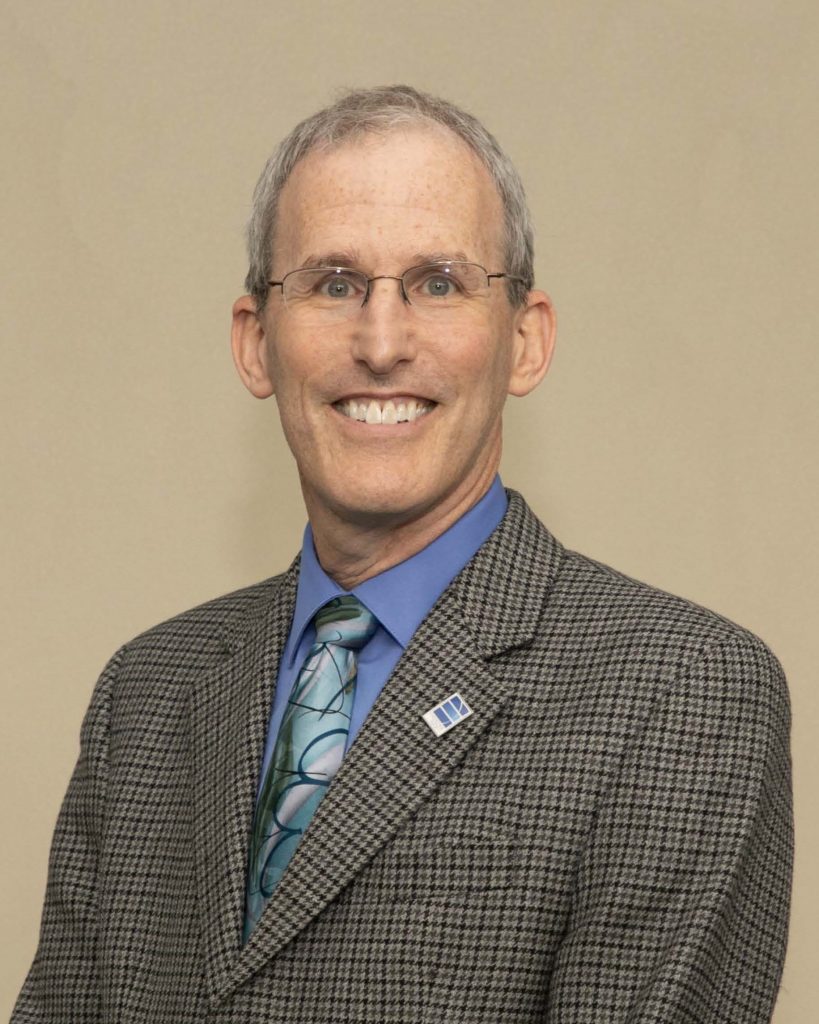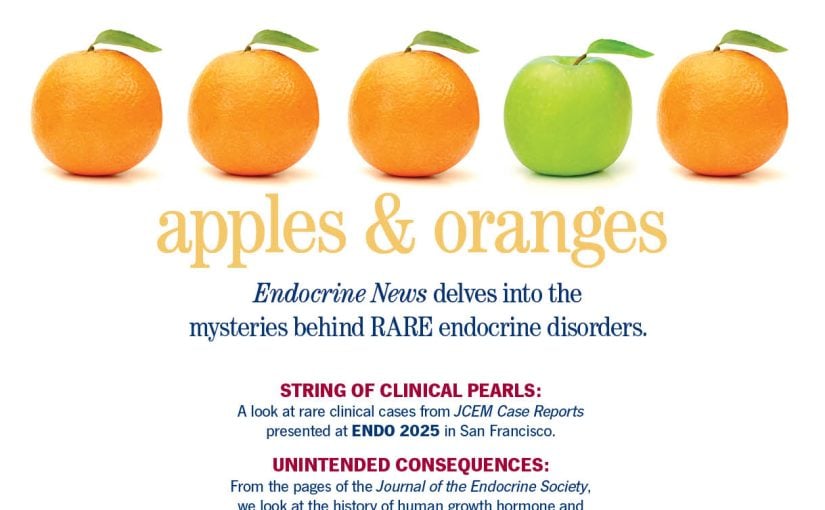
The Endocrine Society is pleased to welcome its president for 2023 – 2024, Stephen Hammes, MD, PhD, who took office during ENDO 2023 in Chicago. Hammes is the Louis S. Wolk Distinguished Professor of Medicine, chief of the Division of Endocrinology, Diabetes and Metabolism, and executive vice-chair of the Department of Medicine at the University of Rochester in Rochester, N.Y. He has served as the Society’s president-elect since June 2022.
Hammes succeeds Ursula B. Kaiser, MD, as the Society continues its rotation of presidents who represent its core constituencies: basic science researchers, clinical researchers, and clinical practitioners. “I’m very excited about it,” he says. “I have been in the Endocrine Society since my career started over 20 years ago — 1999 was my first Endocrine Society meeting, and I don’t think I’ve missed one since then. The Society has done a huge amount for me with regard to my career, and has afforded me the opportunity to meet lifelong colleagues and friends. To have a chance as president to give back to the Society by helping others advance their careers – to me, that’s super exciting.”
Hammes’ laboratory studies steroid signaling, and his clinical focus is on gonadal and adrenal diseases, as well as transgender health. He has served on several Endocrine Society committees, including chairing the Annual Meeting Steering Committee for ENDO 2022, was editor-in-chief of the journals Molecular Endocrinology and Endocrinology, and is currently deputy editor of the Journal of the Endocrine Society.
The Bench and the Bedside
Hammes graduated from Cornell University summa cum laude with a degree in chemistry, then went on to receive his MD and PhD in immunology from Duke University. Hammes tells Endocrine News that he grew up in a family of academics; his father was a physical biochemist at Cornell, which inspired him to pursue chemistry as well. He says that toward the end of his undergraduate program, he learned about MD/PhD programs, and applied with little to no clinical experience, ultimately being accepted to Duke.
He completed his residency in Internal Medicine, followed by his fellowship in Endocrinology at the University of California San Francisco. He says he loved research and clinical medicine, from the bench to the bedside. “I’ve always done both since residency. As a first year endocrine fellow at UCSF, I did primarily clinical work, and when I was done with my first year, I became very focused in the lab, though I still spent about 20% of my time in the clinic. And that’s how it’s been ever since,” he says. “I backed into endocrinology, and I really also backed into medicine. It wasn’t what I thought I would do when I started college, but it ended up being the perfect choice for me. I’ve never looked back, and I’ve loved every minute of it.”
I really think we need to focus on early career, offer opportunities for them to present their work, to participate, to bring their new labs and bring some new energy and excitement to the basic scientists in the Society.”
It was Dolores Shoback, MD, who cemented Hammes’s passion for endocrinology. She was his attending and co-director of his fellowship program at UCSF. Hammes says that it was Shoback who convinced him to go into endocrinology, even though he wasn’t quite sure what all the field comprised. “It just seemed like the right field for me,” Hammes says. “It’s very physiology and research-oriented. It’s all about systems and understanding how different things talk to each other, and that was always what I was fascinated by, so it actually made perfect sense once I started to experience it.”
“I was always interested in signaling,” he continues. “I was always interested in molecular biology and understanding how things work in a biological sense, so it was the perfect subspecialty for me.”
Friends and Colleagues
Hammes recalls how nervous he was attending that first Endocrine Society meeting in 1999, giving a presentation during an oral session on G protein-coupled receptor signaling and trafficking to a group of “famous G protein signaling people” lining the front row. “I was absolutely petrified,” he says. “But it went really, really well. They were super supportive and it ended up being a great experience. They left me with a very positive feeling about the Endocrine Society.”
Hammes says that experience made him want to get more involved, so his mentor at the University of Texas Southwestern Medical Center, the late Keith Parker, MD, PhD, nominated him for the Annual Meetings Steering Committee (AMSC), so he could help plan the meetings. Not only that, but being on the committee is a wonderful way to network, Hammes says. “You go to AMSC, you meet 30 other amazing scientists, and it’s just a great way to meet great colleagues,” he says.
Other important chance meetings also stand out to Hammes. “I was a member of a study section, and Dale Abel [MBBS, MD, PhD] was on that study section,” Hammes continues. “That’s how I met Dale, and he’s been a huge positive influence, including getting me involved in the FLARE program, which has been a tremendous learning experience for me. Then I went to visit University of Pittsburgh and I met a guy named Don DeFranco [PhD] who was a nuclear receptor signaling person, and we’ve been friends and collaborators ever since. So, I met all these Endocrine Society people through various different venues, and they all drew me in. I can say without a doubt that I wouldn’t be where I am today if not for all these interactions.”
Addressing Burnout
Now, as president, Hammes says he hopes to inspire endocrinologists at any level in their careers, just as he was inspired by the Society. What he loves most about his work is teaching, and he hopes he can take that experience and apply it to his new role. “As president of the Endocrine Society, you have to cover everything as you’re leading an entire organization,” he says. “But I think my passion really is teaching, whether it’s students, early career, or mid-career – whomever – helping give people opportunities to be successful, giving some advice, teaching things where I can, and creating opportunities for people. That’s the most fun thing to do. That’s what I love to do in my job as a chief of endocrinology and when I was a fellowship program director.”
“Functionally, we practice it the same way we have for decades, and I don’t think it works anymore. I would like to take a deep dive into that, and I think we have a lot of really smart people with some really good ideas, but I think we need to try to do something about that.”
Hammes says that one of the main goals of his presidency is addressing burnout, especially from a clinical perspective. Too many patients, not enough providers; headaches with electronic medical records – these things contribute to an unhappy workforce. “One thing I want to do is work with leaders in the Society and their own organizations to try and delineate some concrete things that the Society may be able to do to help with burnout; to help us run our clinics most efficiently,” he says. “Functionally, we practice it the same way we have for decades, and I don’t think it works anymore; I would like to take a deep dive into that. We have a lot of really smart people with some really good ideas, and we need to work together to find solutions.”
On the research side, Hammes says he was to continue to support basic, translational, and clinical research and especially focus on early career investigators and get them involved with the Endocrine Society, the same way Society members got him involved. “If you get them involved early, then they’re going to stay involved and they’re going to consider the Society part of their family,” he says, “so I really think we need to focus on early career, offer opportunities to present their work, to participate, to bring their lab and team members to the annual meeting, and to bring new energy and excitement to research in the Society.”

